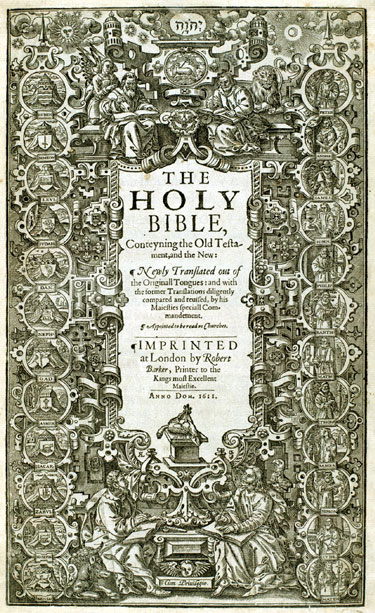 This year is the 400th anniversary of the King James Version (KJV) of the Bible. Over at ChristianityToday.com, Mark A. Noll asks, “What would it have been like if the KJV had always been only one among several competing English-language versions of the Bible?”His answer:
This year is the 400th anniversary of the King James Version (KJV) of the Bible. Over at ChristianityToday.com, Mark A. Noll asks, “What would it have been like if the KJV had always been only one among several competing English-language versions of the Bible?”His answer:
When the KJV became the cultural and literary standard for the entire English-speaking world, it was easier to focus on the literary excellence of the translation without stopping to face the divine imperatives and promises that are any Bible’s primary reason for existence. The pervasive cultural presence of this Bible also made it easy to exploit scriptural words, phrases, images, and allusions for their evocative power, even when those uses contradicted the Bible’s basic spiritual meaning.
Yet even soberly considered, the immense good accomplished in and through the KJV is a marvel. When the KJV became the cultural and literary standard for the entire English-speaking world, the spiritual impact of the Bible was certainly enhanced because the scriptural message was carried far and wide via an all-pervasive cultural standard. The substance of divine revelation that lay immediately beneath the words of the KJV could also exert a dramatic public impact for good, precisely because this translation so dominated the English-speaking world.
__________
 Over at Patheos.com, John Fea concludes an excellent four-part series on the Civil War as a war between two “Christian nations.”
Over at Patheos.com, John Fea concludes an excellent four-part series on the Civil War as a war between two “Christian nations.”
- Part 1: “One Nation, Under God, Indivisible”
- Part 2: “God’s Judgment Upon the South”
- Part 3: “The Confederacy’s “Christian Nation”
- Part 4: “A Slaveholding Nation is a Christian Nation”
Fea’s conclusion is worth keeping in mind when you hear talk about America as a “Christian nation”:
As we’ve seen over the past four columns, by 1860 there were two visions of Christian America. Many Northerners believed that the national Union was sacred because it was created and blessed by God. Many Southerners argued that the Confederate States of America was a Christian nation because the Bible’s teachings were compatible with a southern way of life.
Throughout American history there was seldom a common understanding of what it meant to be a Christian nation. The Civil War is merely one example. This is certainly something to remember whenever we get the urge to talk about America’s so-called Christian roots.
If you like what you read, check out Fea’s America as a Christian Nation: A Historical Introduction.
__________
C. S. Lewis on Evolution and Intelligent Design.
__________
The Arts & Faith Top 100 Films does not include The Mission but it does include The Story of the Weeping Camel. Something’s seriously wrong with this list.
__________
Who is the devil like? David Bentley Hart offers these thoughts:
- “the sort of person you try your best to get away from at a party”
- “A merciless real estate developer whose largest projects are all casinos.”
- “Donald Trump—though perhaps just a little nicer”
Ouch. And, heh.
__________
“Faith unshaken by tornado.” Well, yeah. Psalm 46:1–3.
__________
“Bin Laden’s theology a radical break with traditional Islam.” That’s both true and good to know, although Mollie Hemingway has some questions.
__________
“Every saint has a past and every sinner has a future.” There Be Dragons, a new film about Opus Dei founder Josemaría Escrivá, gets a good review from Cathleen Falsani Possley.


A bunch of Christian voters liked certain movies more than a movie you like. It happens.